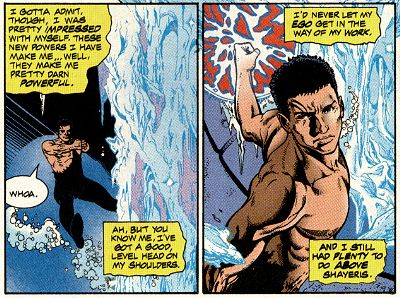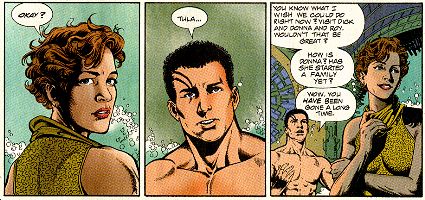Tempest

 It was obvious at first glace that Phil Jimenez could draw. His attention to anatomy, proportion, and detail is reminiscent of the legendary George Pérez (of Crisis on Infinite Earths and Wonder Woman fame). With a good, equally meticulous inker (such as John Stokes), his art is quite beautiful.
It was obvious at first glace that Phil Jimenez could draw. His attention to anatomy, proportion, and detail is reminiscent of the legendary George Pérez (of Crisis on Infinite Earths and Wonder Woman fame). With a good, equally meticulous inker (such as John Stokes), his art is quite beautiful.
 But can he write?
But can he write?
I’d have to say the answer is “yes”.
This series is about Garth, the last of the original Teen Titans to “graduate” from sidekick status and establish himself as a hero in his own right, with a name of his own. Robin had long since left Batman and become Nightwing, Kid Flash had taken over as the Flash after his mentor’s death, Green Arrow’s ward Speedy was now Arsenal, and Wonder Girl had undergone enough identity changes to leave people wondering just who Donna Troy was. But Garth was still Aqualad, a name so hokey he simply had to lose it before the century was out. The me-too powers he shared with Aquaman (breathing water, mostly) were also a bit limiting, so Jimenez set out to go beyond that as well. He needed a personality… and how about a new costume while we’re at it?
 To accomplish these goals, Jimenez delved deep into the character’s history, both his pre-Crisis history as part of the “Aqua-family”, and the historical mytho-sociology developed in recent years to flesh out Aquaman, king of Atlantis. In particular, it focused on Garth’s special heritage and his love for Tula (aka Aquagirl), one of the several characters killed (as superfluous) in the universe-altering story of Crisis. Or was she?
To accomplish these goals, Jimenez delved deep into the character’s history, both his pre-Crisis history as part of the “Aqua-family”, and the historical mytho-sociology developed in recent years to flesh out Aquaman, king of Atlantis. In particular, it focused on Garth’s special heritage and his love for Tula (aka Aquagirl), one of the several characters killed (as superfluous) in the universe-altering story of Crisis. Or was she?
She evidently wasn’t superfluous to Garth. And when she suddenly reappears, years after her death, Garth is thrown for a bit of a loop. But enough teasers about the plot.
 Although I “dismissed” Jimenez’ art at the beginning of the review, it really does merit some attention. He manages a feat few comics artists even aspire to: drawing male characters as attractive as female characters. (OK, many artists accomplish this by drawing all of their characters hideously. That’s cheating. {grin}) I hate to pick on the handicap that so many straight male artists labor under… but there you have it. And frankly, Jimenez’ female figures are among the most genuinely attractive I’ve seen in comics, so I’m definitely not daming with faint praise. But he also succeeds at drawing the hideous, bizarre, and even the mundane. (There’s not much mundane in Tempest, but I’ve seen it in work he’s done elsewhere.) He puts as much care and detail into, for example, a horde of undead Atlantean monsters as he does, say, Garth’s eyes.
Although I “dismissed” Jimenez’ art at the beginning of the review, it really does merit some attention. He manages a feat few comics artists even aspire to: drawing male characters as attractive as female characters. (OK, many artists accomplish this by drawing all of their characters hideously. That’s cheating. {grin}) I hate to pick on the handicap that so many straight male artists labor under… but there you have it. And frankly, Jimenez’ female figures are among the most genuinely attractive I’ve seen in comics, so I’m definitely not daming with faint praise. But he also succeeds at drawing the hideous, bizarre, and even the mundane. (There’s not much mundane in Tempest, but I’ve seen it in work he’s done elsewhere.) He puts as much care and detail into, for example, a horde of undead Atlantean monsters as he does, say, Garth’s eyes.
This is a beautifully rendered, dramatic, and touching tale, well worth the mere $7.00 it cost.
A rather pleasant surprise came at the end of the series. In the text pages at the back of the last issue, Jimenez wrote about Neal Pozner, a DC editor who died of AIDS complications in 1994. As Senior Editor of Creative Services, Pozner was the man responsible for bringing many talented artists to DC and the industry (including Jimenez). He was the man who gave Aquaman a striking new costume in the limited series he wrote featuring the character in the 1980’s. And he was the man Jimenez loved.
Jimenez wrote openly and lovingly about his relationship with Pozner and what he meant to him, conveying more feeling in a few column-inches and fostering more understanding of gay relationships than every “gay story” to appear with the “DC” bullet on the cover combined. (I’m not counting Stuck Rubber Baby, published by the DC-run Paradox Press.) Although I’ve commented that “only an ogre” would have objected to this use of this space, I feel that DC should be commended for letting Jimenez run that piece, since it would have been so very easy to argue that it was “inappropriate” for the lettercol of a superhero comic. (My former employer proved not quite so tolerant.) And I commend Jimenez for the courage to write it, baring his soul to the world as he did. It’s an empowering and liberating step, but if Jimenez’ life has been anything like mine before I came out, it wasn’t easy getting to the point of being ready to do it. Kudos (and hugs).
Some might argue that such openness is a liability and a bad career move. But if it goes along with such moving writing and engaging art as Jimenez produced for this limited series (and you’re not actually looking to work for bigots), I can’t see how or why.
